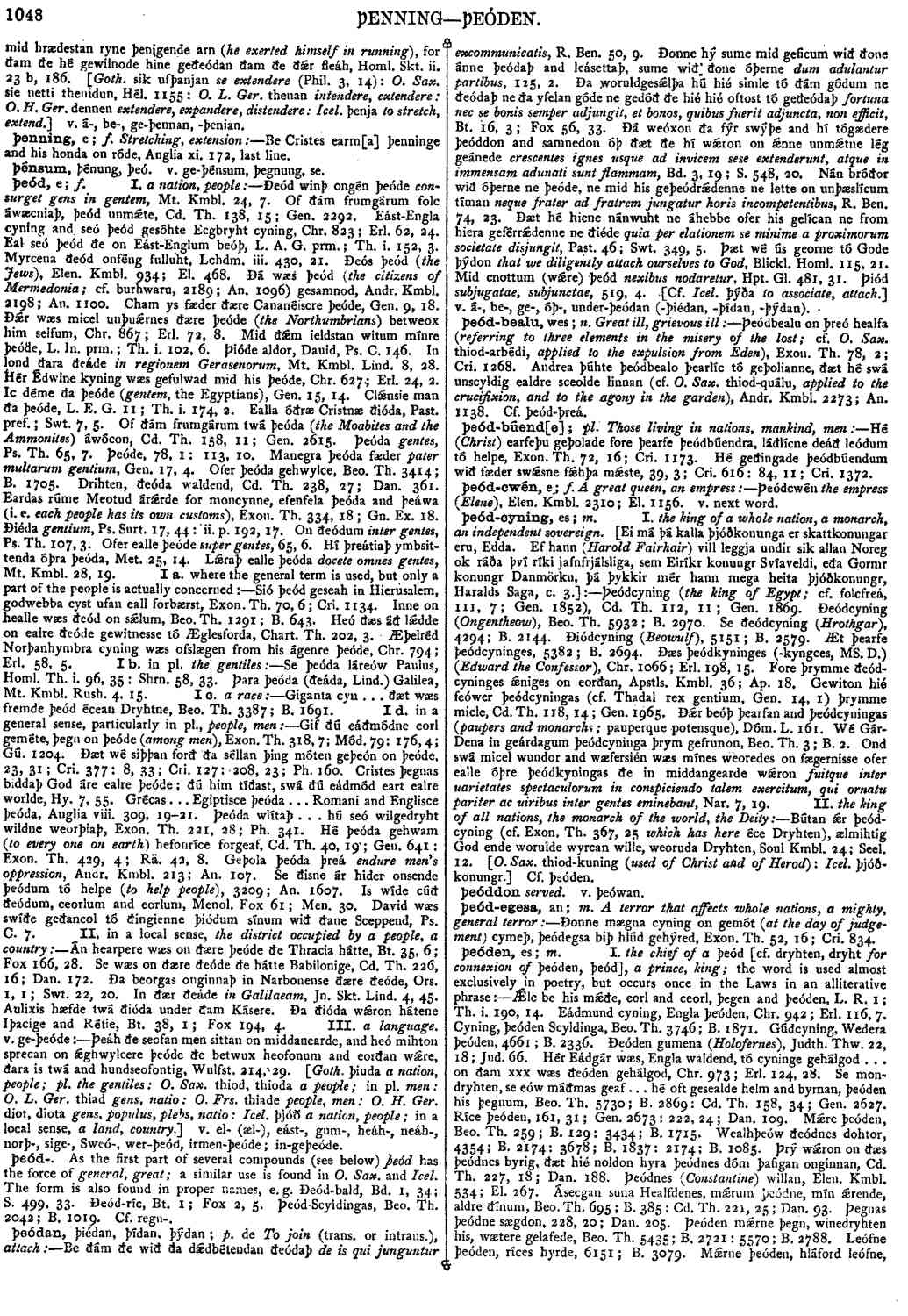þeód
- noun [ feminine ]
-
Ðeóð winþ ongén þeóde
consurget gens in gentem,
- Mt. Kmbl. 24, 7.
-
Of ðám frumgárum folc áwæcniaþ, þeód unmǽte,
- Cd. Th. 138, 15; Gen. 2292.
-
Eást-Engla cyning and. seó þeód gesóhte Ecgbryht cyning,
- Chr. 823; Erl. 62, 24.
-
Eal seó þeód ðe on Eást-Englum beóþ,
- L. A. G. prm.; Th. i. 152, 3.
-
Myrcena ðeód onféng fulluht,
- Lchdm. iii. 430, 21.
-
Ðeós þeód (
the Jews
),- Elen. Kmbl. 934; El.
468.
-
Ðá wæs þeód (
the citizens of Mermedonia;
cf. burhwaru,- 2189; An. 1096) gesamnod, Andr. Kmbl. 2198; An. 1100.
-
Cham ys fæder ðære Cananéiscre þeóde,
- Gen. 9, 18.
-
Ðǽr wæs micel unþuǽrnes ðære þeóde (
the Northumbrians
) betweox him selfum,- Chr. 867; Erl. 72, 8.
-
Mid ðǽm ieldstan witum mínre þeóde,
- L. In. prm.; Th. i. 102, 6.
-
Þióde aldor,
- Dauid, Ps. C. 146.
-
In lond ðara ðeáde
in regionem Gerasenorum,
- Mt. Kmbl. Lind. 8, 28.
-
Hér Édwine kyning wæs gefulwad mid his þeóde,
- Chr. 627; Erl. 24, 2.
-
Ic déme ða þeóde (
gentem,
the Egyptians),- Gen. 15,
14.
-
Clǽnsie man ða þeóde,
- L. E. G. ii; Th. i. 174, 2.
-
Ealla óðræ Cristnæ ðióda,
- Past. pref.; Swt. 7, 5.
-
Of ðám frumgárum twá þeóda (
the Moabites and the Ammonites
) áwócon,- Cd. Th. 158, 11; Gen. 2615.
-
Þeóda
gentes,
- Ps. Th. 65, 7.
-
Þeóde,
- 78, 1: 113, 10.
-
Manegra þeóda fæder
pater multarum gentium,
- Gen. 17, 4.
-
Ofer þeóda gehwylce,
- Beo. Th. 3414; B. 1705.
-
Drihten, ðeóda waldend,
- Cd. Th. 238, 27; Dan. 361.
-
Eardas rúme Meotud árǽrde for moncynne, efenfela þeóda and þeáwa (i.e.
each people has its own customs
),- Exon. Th. 334, 18; Gn. Ex. 18.
-
Ðiéda
gentium,
- Ps. Surt. 17, 44: ii. p. 192, 17.
-
On ðeódum
inter gentes,
- Ps. Th. 107, 3.
-
Ofer ealle þeóde
super gentes,
- 65, 6.
-
Hí þreátiaþ ymbsittenda óþra þeóda,
- Met. 25, 14.
-
Lǽraþ ealle þeóda
docete omnes gentes,
- Mt. Kmbl. 28, 19. I a.
-
Inne on healle wæs ðeód on sǽlum,
- Beo. Th. 1291; B. 643.
-
Heó ðæs áð lǽdde on ealre ðeóde gewitnesse tó Æglesforda,
- Chart. Th. 202, 3.
-
Æþelréd Norþanhymbra cyning wæs ofslægen from his ágenre þeóde, Chr. 794; Erl. 58, 5. I b. in pl.
the gentiles
:-- Se þeóda láreów- Paulus, Homl. Th. i. 96, 35: Shrn. 58, 33.
-
Þara þeóda (ðeóda, Lind.) Galilea, Mt. Kmbl. Rush. 4, 15. I c.
a race :-- Giganta cyst ... ðæt wæs fremde þeód écean Dryhtne, Beo. Th. 3387; B. 1691. I d. in a general sense, particularly in pl., people, men :-- Gif ðú eáðmódne eorl geméte, þegn on þeóde (among men ),
- Exon. Th. 318, 7; Mod. 79: 176, 4; Gú. 1204.
-
Ðæt wé siþþan forð ða séllan þing móten geþeón on þeóde,
- 23, 31; Cri. 377: 8, 33; Cri. 127: 208, 23; Ph. 160.
-
Cristes þegnas biddaþ God áre ealre þeóde; ðú him tíðast, swá ðú eádmód eart ealre worlde,
- Hy. 7, 55.
- Grécas ... Egiptisce þeóda ... Romani and Englisce þeóda, Anglia viii. 309, 19-21.
-
Þeóda wlítaþ ... hú seó wilgedryht wildne weorþiaþ,
- Exon. Th. 221, 28; Ph. 341.
-
Hé þeóda gehwam (
to every one on earth
) hefonríce forgeaf,- Cd. Th. 40, 19; Gen. 641; Exon. Th. 429, 4; Rä. 42, 8.
-
Geþola þeóda þreá
endure men's oppression,
- Andr. Kmbl. 213; An. 107.
-
Se ðisne ár hider onsende þeódum tó helpe (
to help people
),- 3209; An.
1607.
-
Is wíde cúð ðeódum, ceorlum and eorlum,
- Menol. Fox 61; Men. 30.
-
David wæs swíðe geðancol tó ðingienne þiódum sínum wið ðane Sceppend,
- Ps. C. 7.
-
Án hearpere wæs on ðære þeóde ðe Thracia hátte,
- Bt. 35, 6; Fox 166, 28.
-
Se wæs on ðære ðeóde ðe hátte Babilonige,
- Cd. Th. 226, 16; Dan. 172.
-
Ða beorgas onginnaþ in Narbonense ðære ðeóde,
- Ors. 1, 1; Swt. 22, 20.
-
In ðær ðeáde
in Galilaeam,
- Jn. Skt. Lind. 4, 45.
-
Aulixis hæfde twá ðióda under ðam Kásere. Ða ðióda wǽron hátene Iþaeige and Rétie,
- Bt. 38, 1; Fox 194, 4.
-
Þeáh ðe seofan men sittan on middanearde, and heó mihton sprecan on ǽghwylcere þeóde ðe betwux heofonum and eorðan wǽre, ðara is twá and hundseofontig,
- Wulfst. 214, 29.
Bosworth, Joseph. “þeód.” In An Anglo-Saxon Dictionary Online, edited by Thomas Northcote Toller, Christ Sean, and Ondřej Tichy. Prague: Faculty of Arts, Charles University, 2014. https://bosworthtoller.com/31670.
Checked: 0